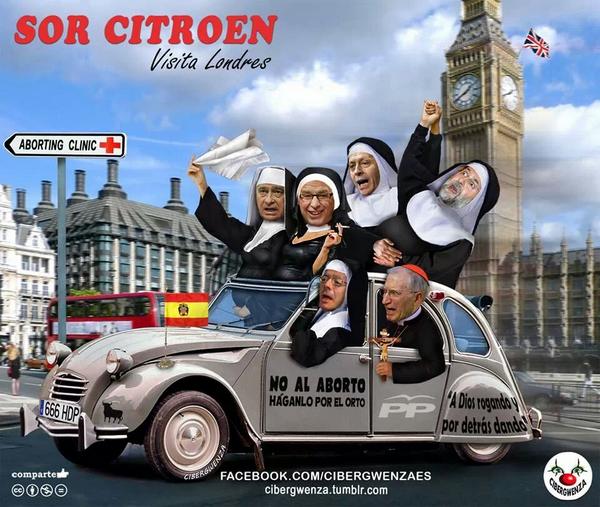
Demonstration against Justice Minister Gallardon's abortion bill in February 2014. Photo uploaded to Twitter by Javier López. Used with permission.
A proposed law that would make Spain one of the most restrictive European countries on abortion is without a doubt the most controversial legislation put forward by the government of Prime Minister Mariano Rajoy since his Partido Popular (PP) came to power with an absolute majority in 2011.
Christened “The Organic Law for the Protection of the Life of the Unborn and the Rights of the Pregnant Woman” by its promoter, Justice Minister Alberto Ruiz Gallardón, the legislation has not only found opposition across the Spanish political landscape, it has also faced a criticism within the ranks of the ruling PP.
It now looks as though the bill may have finally stalled—at least, according several national newspapers.
In an article titled “The Abortion Law Won't See the Light,” Lucía Méndez for El Mundo explains that the reason for this policy shift lies in several upcoming elections:
la ley del aborto ha sido muy perjudicial para los intereses electorales del PP, ya que una sólida mayoría de sus votantes se han sentido sumamente incómodos con el tema. Ni querían ni esperaban que el Gobierno legislara de forma tan restrictiva sobre una cuestión que afecta de lleno a las mujeres, por lo que la conclusión de los expertos es clara: hay que reconducir la situación y pasar la página para no abrir otra vez una controversia que haga daño al PP en un año clave con dos convocatorias electorales: las municipales y las generales.
The abortion bill has been very damaging to the electoral interests of the PP, since a solid majority of its voters have felt extremely uncomfortable with the subject. They neither wanted nor expected the government to legislate so narrowly on an issue that affects women in every respect. So the verdict of the experts is clear: the situation must be corrected and the page turned in order to avoid another controversy that could damage the PP in a pivotal year when both a municipal and a general election are pending.
El diario asserts that the massive loss of votes in the most recent elections may have been what provoked a strong reaction against the bill within the Popular Party:
Según fuentes de la cúpula del PP citadas por el medio, “no existe consenso en torno a este proyecto, y si no se logra un acuerdo, cosa que parece muy difícil, la ley no se aprueba y en paz”. Otros interlocutores son incluso más contundentes: “Esa ley nunca llegará al Parlamento”.
According to sources in the upper echelons of PP quoted in the media, “There is no consensus on this project, and if an agreement, which seems very difficult, is not achieved, the law won't pass and that will be that.” When asked, others are even more blunt: ” The law will never reach Parliament.”
The first law on abortion in Spain dates back to 1985 and was approved during the mandate of the first socialist government following the end of Francisco Franco's nearly 40-year dictatorship. This law decriminalized abortion in three circumstances: rape, fetal malformation, and danger to the life of the mother. In 2010, new legislation, which is currently in force, extended the reproductive rights of Spanish women, allowing them to freely abort in the first 14 weeks of pregnancy, until week 22 in cases of danger to the mother, and at any time in cases of severe fetal malformation.
With Gallardón's proposed reform, the 2010 law—which is similar to those in most European countries—would have been seen its scope reduced dramatically to well before the 1985 provisions. For example, the PP bill would remove the exemption for malformation and the right of minors to have abortions without the consent of their guardians, and it would go so far as to require a woman to prove her mental or physical state was at risk by means of reports by two physicians in different medical health centers, turning an already stressful time into an obstacle course. And if that were not enough, the bill would impose a seven-day period of mandatory reflection.
Many people accuse Gallardón of legislating in a sectarian and partisan way, taking into account only the will of the most reactionary sector of society, led by the Catholic Church in the person of former Archbishop of Madrid and President of the Episcopal Conference Antonio María Rouco Varela—and doing so against the wishes of the vast majority of Spanish people, who see no need to amend the current law.
In defence of his project, Gallardón went so far as to declare in Parliament that motherhood “is what makes a woman a real woman,” which led socialist MP Patricia Hernandez to quip, “Being a mother doesn't make a woman more of a woman just as being a minister doesn't make a man smarter.”
After news of the alleged suspension of the bill, many netizens attributed the PP's U-turn to the proximity of the municipal elections, many even taking for granted that the bill would be taken up again if the PP wins the impending municipal vote. According to commenter Otrociudadano in El diario:
Lo hacen por el descalabro electoral que se avecina, no por ideas y conciencia social. Otra mayoría absoluta y lo encajan al día siguiente.
They're doing it because of the looming disaster in the polls, not because of ideas or social conscience. Another absolute majority and they'll dump it back on us the next day.
Sciuro in newspaper Público y mason33 in El Mundo also think it is just an election maneuvre:
Ya se sabe, la postura oficial del PP respecto del aborto es “radicalmente en contra en los dos años siguientes a unas elecciones y respeto democrático el resto del tiempo”.
We all know the official position of the PP regarding abortion is “radically against it in the two years following an election and respect for democracy the rest of the time.”
Mas claro, el agua! La ley del aborto les ha perjudicado electoralmente y la retiran por ahora. Hasta despues de las elecciones. Habra algun ingenuo que pique? Lo que importa es el poder. No tienen ni espina dorsal!
Crystal clear! The abortion bill has damaged them politically and they are shelving it for now. Until after the elections. Is anyone gonna fall for this? What counts is power. They have no backbone!

Archbishop Rouco and various government ministers visit London, a city in which thousands of Spanish women received abortions before the 1985 law. [Spoof of 1960s Spanish film] Image uploaded to Twitter by no_pasaran#. Used with permission.
El PP renuncia a la reforma electoral en Ayuntamientos y a la reforma de la ley del aborto, todo en unos días. No hay miedo no, hay pavor
— Borja Ventura (@borjaventura) September 12, 2014
The PP is dropping the municipal electoral reform and the abortion law reform, all in a matter of days. They aren't afraid, they're terrified.
EL ABORTO LIBRE ES UN GENOCIDIO NAZI, pero oye, si nos quita muchos votos lo dejamos como está. #Principios
— Els quatre gats (@Els_quatre_gats) September 13, 2014
THE RIGHT TO ABORTION IS NAZI GENOCIDE, but listen, if it means we lose votes, we'll leave it as is.
El frenazo a la ley del aborto es electoralista, no ideológico. Así que ya sabemos qué pasará si vuelven a ganar.
— Miky Injun (@miky_co) September 13, 2014
Putting the brakes on the abortion law is electoral pandering, not ideology. So we know what will happen if they win again.
Perhaps the proximity of the election is not the only reason, as Javier Lezaola points out on Twitter:
Pues parece q se va confirmando q la supuesta ley del aborto era poco más q una maniobra de distracción para colar las políticas del FMI
— Javier Lezaola (@JavierLezaola) September 13, 2014
So it looks like it's true that the abortion bill was just a distraction tactic to sneak in IMF policies.







1 comment